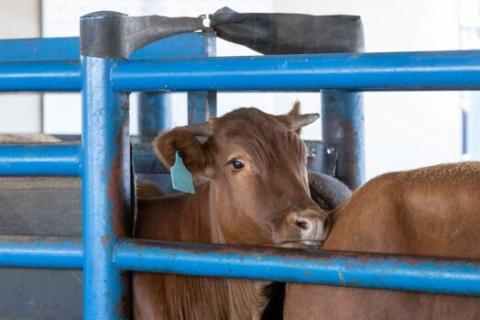Description
This self-paced course focuses on pain management in beef calves. It features a recorded presentation by Michael Kleinhenz, DVM, PhD, DACVCP and is approved for 0.5 hours of veterinary continuing education (CE) credit through the University of Missouri College of Veterinary Medicine.
Syllabus
⬅ Return to Home Page 📚 Go to Content Modules
Description
This course reviews pain management options for beef calves. It outlines the FDA’s position on NSAID use for alleviating pain and compares available drug options. Effectiveness of meloxicam and other NSAIDs, withdrawal times and practical considerations for administration, are also discussed. (Recorded August 10, 2021; Reviewed August 1, 2025)
Learning Objectives
Individuals who complete this course will be able to:
- Explain the FDA’s position on extra-label use of NSAIDs for pain control in cattle.
- Compare NSAID options commonly used for pain management in beef cattle.
- Recognize the limitations of currently approved pain control drugs in cattle.
- Discuss practical considerations for using NSAIDs in cattle pain management.
Course Content
This course contains:
- A recorded webinar and full transcript covering the topic
- A five-question quiz required for CE credit
- An optional course evaluation survey
Presenter: Michael Kleinhenz, DVM, PhD, DACVCP
Dr. Kleinhenz is a Clinical Associate Professor in the Department of Large Animal Clinical Sciences at Texas A&M University’s Veterinary Education, Research, and Outreach (VERO) campus, where he also serves as Interim Associate Dean for Administration. He earned his B.S. in Agriculture (Dairy Sciences) and Doctor of Veterinary Medicine from The Ohio State University, completed a dairy production residency at Iowa State University, and obtained a PhD in Pharmacology with a concurrent clinical pharmacology residency at Kansas State University. Dr. Kleinhenz’s professional experience includes working in private dairy practice and serving as a clinical pharmacologist and production medicine veterinarian at Kansas State University. His research focuses on cattle health and welfare, pharmacology, pain management, and lameness prevention.
Continuing Education (CE) Credit
This course is approved for 0.5 hours of veterinary continuing education (CE) credit by the University of Missouri College of Veterinary Medicine.
To earn CE credit, you must:
- View the full presentation or read the transcript
- Complete the 5-question quiz with at least 4 correct answers
- Download your CE certificate (instructions are provided in the module)
Please note: It is the participant’s responsibility to verify whether CE credit from an AVMA-accredited veterinary college meets the requirements of their state or licensing jurisdiction.
Course Evaluation
A brief, optional evaluation is available at the end of the course. Your feedback is valuable and helps us improve future courses.
Accessibility & Support
- All videos include closed captions and downloadable transcripts.
- For disability-related accommodations, contact MU Extension ADA Support
- Canvas Support: teachingtools@umsystem.edu
- Course Coordinator: Craig Payne
Accommodations
We all learn differently, and we want every student to succeed. University of Missouri Extension complies with the Americans with Disabilities Act of 1990. If you have a disability and need accommodations in connection with this course, or you need materials in an alternate format, please notify your instructor as soon as possible so that necessary arrangements can be made.
MU Extension Equal opportunity, ADA institution information
Inclusive Course Design
This course was created with a wide range of learners in mind. The materials are designed to be accessible and support different ways of learning.
Technical Requirements
Minimum Technology
- A reliable high-speed internet connection (DSL or cable recommended)
- A computer with an up-to-date operating system (Windows, macOS, or Linux)
- A current web browser, such as Google Chrome, Microsoft Edge, or Safari
- A processor speed of at least 1 GHz (or higher)
Technical & Digital Information Literacy Skills
- Ability to download, open, and save Microsoft Word and PDF documents
- Basic familiarity with Canvas features
- Use of basic computer peripherals: speakers or headphones for audio
Download the Canvas Student App to access your Canvas course from your mobile device.
For the best user experience, we recommend using Google Chrome (Safari for Macintosh). If you don't have Google Chrome installed on your computer, you can download it here.
If you have technical questions or need help, please email Canvas Support. You can find additional technical information on the Canvas website.
Course Completion
Upon completion of all required components, participants may download a CE certificate from within the Canvas course. If needed, a transcript of completed MU Extension online courses may also be accessed through your Catalog account.
